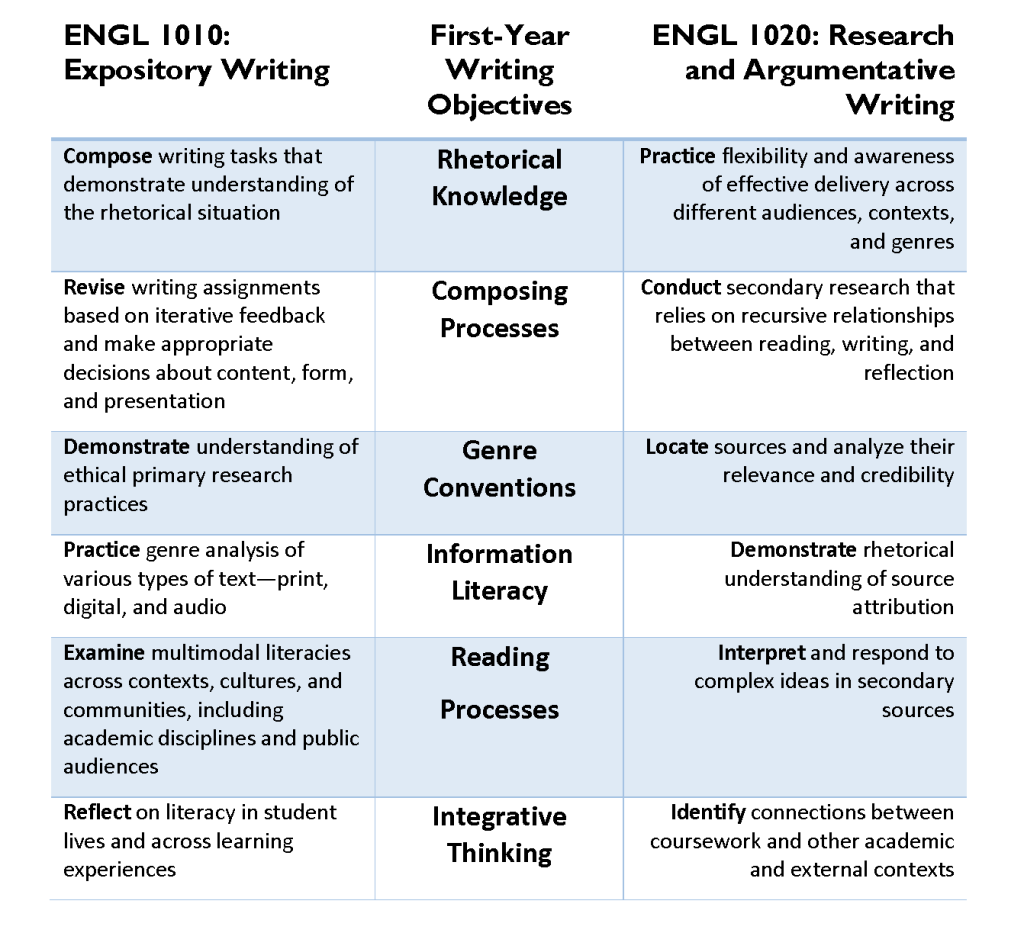True Blue Core Objectives
True Blue Core Objectives
Program Outcomes and Learning Objectives are the foundation for the first-year writing sequence at MTSU (see figure 1). Our first-year writing courses have a rhetorical foundation that draws attention to the questions we should ask when composing, as well as the conventions, norms, and expectations of different genres. We approach learning about the writing process this way instead of trying to prepare you for each individual genre you will encounter in your academic and professional life because writing contexts are always changing! The genres you’re writing in today will likely not be the ones most important to your careers, and you may be composing in totally different genres in the near future, but learning about the thinking, situations, processes, habits, and practices associated with effective writing will transfer to your future writing opportunities.

First-Year Writing at MTSU
The First-Year Writing sequence includes ENGL 1010: Expository Writing and ENGL 1020: Research and Argumentative Writing. ENGL 1020 builds on the knowledge and skills students hone in ENGL 1010. Figure 1 (above) demonstrates the ways that the two classes build on each other, meeting the required True Blue Core Outcomes of Written Communication and Information Literacy. The objectives for each class are further detailed below.
ENGL 1010 True Blue Course Objectives
- Examine multimodal literacies across contexts, cultures, and communities, including academic disciplines and public audiences (Reading Processes)
- Reflect on literacy in student lives and across learning experiences (Integrative Thinking)
- Compose writing tasks that demonstrate understanding of the rhetorical situation (Rhetorical Knowledge)
- Revise writing assignments based on iterative feedback and make appropriate decisions about content, form, and presentation (Composing Processes)
- Demonstrate understanding of ethical primary research practices (Genre Conventions)
- Practice genre analysis of various types of text—print, digital, and audio (Information Literacy)
ENGL 1020 True Blue Course Objectives
- Conduct secondary research that relies on recursive relationships between reading, writing, and reflection (Composing Processes)
- Practice flexibility and awareness of effective delivery across different audiences, contexts, and genres (Rhetorical Knowledge)
- Locate sources and analyze their relevance and credibility (Genre Conventions)
- Demonstrate rhetorical understanding of source attribution (Information Literacy)
- Interpret and respond to complex ideas in secondary sources (Reading Processes)
- Identify connections between coursework and other academic and external contexts (Integrative Thinking)
Our focus in this book is on ENGL 1020, Research and Argumentative Writing, which teaches the skills that constitute Information Literacy: writing and analyzing arguments, research processes, as well as locating, organizing, and using library resource materials. According to the True Blue Core, “Information literacy is the ability to know when there is a need for information and to be able to identify, locate, evaluate, and effectively and responsibly use and share that information for the problem at hand. Information literacy assumes a broad definition of information, including but not limited to print, digital, media, technology, scientific, artistic, and other types of information.” ENGL 1020 builds on ENGL 1010’s rhetorical focus and primary research opportunities, inviting students to see themselves as knowledge creators participating in important and exciting research. Students spend the semester developing a research project, targeting an appropriate venue for their research, modeling attendant genre conventions, and sharing their research with colleagues.
Media Attributions
- True Blue Core Course Objectives
to make by putting together parts or elements: to make up, form, frame, fashion, construct, produce; to make or produce in literary form, to write as author
the elements, themes, topics, tropes, characters, situations, and plot lines common in specific genres--types of writing
often thought of as a type or category of writing, e.g. business memos, organization charts, menus, book reviews; a discursive response to a recurrent, social action; materials that mediate social interaction
the act of bringing knowledge or skills from one context to another; the goal of a first-year writing course is to transfer the writing skills developed in the class to other writing situations

